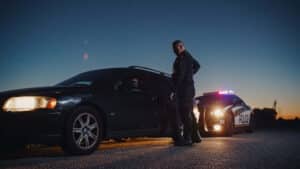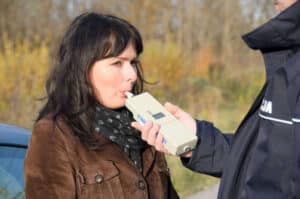- Home
- THE FIRM+
- Criminal Defense+
- CASE RESULTS
- AREAS WE SERVE+
- FAQ’s
- Blog
- Contact
DUI Defense Lawyer in Chicago
Experienced Defense Attorney Defending Clients against DUI Charges in Illinois
In Illinois, it is against the law to drive a motor vehicle while under the influence of alcohol or drugs, including prescription medication, and the penalties for offenses of this nature are severe. When an officer observes a driver committing any type of traffic offense, such as speeding or improper lane usage, the officer may pull the driver over.
Once the driver approaches the vehicle and smells the odor of an alcoholic beverage and other signs of impairment, he will ask the driver to step out of the vehicle and begin performing field sobriety tests. Getting arrested for driving under the influence of alcohol is always nerve-wracking.
What to Expect From Your First DUI Offense
A DUI case is a very common offense, and it can happen to anyone. Thankfully, the Illinois Legislature designed a way for individuals charged with their first offense to walk away from the ordeal fairly unscathed without having a revoked driver’s license.
Penalties Become More Severe After the First Offense
Subsequent offenders are not quite as lucky. The Illinois DUI case laws are codified at 625 ILCs 5/11-501, laying out the different ways a driver can get charged with a DUI case and the potential penalties.
First-time DUI offenders in Chicago, Illinois, are eligible for a finding of Court Supervision, which is a finding of guilt, but it is not a conviction. Drivers are eligible for Court Supervision only once in their life. Without a conviction for a DUI, their licenses will not be revoked, eliminating the need for formal hearings with the Illinois Secretary of State. Once you have used up your one supervision, you are no longer legally eligible for it, and you will be faced with a DUI conviction.
The penalties vary greatly between the first and second offenses for DUIs.
Drunk Driving / DUI Crimes Penalties in Illinois
| First Offense | Second Offense | |
| Fine: | $500 | $1,250 |
| Revocation: | No | Yes |
| Length of suspension: | 6 mo’s / 12 mo’s | 1 year / 3 years |
| MDDP / BAIID: | Yes | No |
| Community Service: | 100 hours | 240 hours |
The first two DUI arrests in Illinois, absent any aggravating circumstances, will be class A misdemeanors, punishable by up to 364 days in jail. A third offense for a DUI will be a class 2 felony punishable by 3-7 years in jail.
Field Sobriety Tests and Portable Breath Test
Many people often wonder whether it is advisable to submit to field sobriety tests and portable breath tests at the scene of the stop. Officers are trained to ask people out of the car and to perform a series of tests to “make sure they are good to drive.”
They do not mention that when they ask the driver, they have already decided to make an arrest, and no matter how well you perform on the tests, you will be taken into custody. The field sobriety tests are all voluntary, and politely declining to perform them will not, in any way, affect your license.
Standard Field Sobriety Tests That Officers Administer Include:
- Horizontal Gaze Nystagmus Test (HGN)
- Walk and Turn Test (WAT)
- One Leg Stand Test (OLS)
- Portable Breath Test (PBT)
Field sobriety tests are not 100% accurate, so it is important to have a criminal lawyer dissect the police reports and find faults in the officer’s notes and conclusions.
The portable breath test is also voluntary, and it cannot lead to the suspension of your license, but the officer can use those test results for probable cause to arrest you. Therefore, it is often a better idea to decline performing any field sobriety tests.
How to Defeat Field Sobriety Tests
Law enforcement officers and testing personnel must follow certain procedures during testing and before arresting for DUI. Failure to follow the regulations closely may result in evidence being excluded from the trial or damaging the officer’s credibility. For example, if the officer’s report said that the driver missed heel to toe during the OLS test, I would ask him the following questions:
- Your report does not state which specific tests my client missed heel to toe, correct?
- Your report also does not mention how much the gap between his heel and his toe was, correct?
- Did you prepare this report?
- And you intended it to be complete and accurate?
- But your report lacks any specifics regarding my client’s performance on the WAT test, correct?
This is just one of many examples of how a defense lawyer can take a report and find clues and gaps that the officer left open. A trained lawyer can discredit the officer’s report and find inconsistencies between the report, his testimony, and the video of the stop.
What about the Breathalyzer at the Station?
While the portable breathalyzer test is only used for probable cause to arrest, it is inadmissible at trial and cannot lead to the suspension of your license. However, the breathalyzer on the scene can be used against you at trial, and the length of the suspension will depend on whether you have performed the test or refused to blow.
If, on your second DUI, you perform the test and blow over a .08, you will be faced with a 1-year suspension. If you refuse to blow, you will face a three-year suspension. A chemical test may show a false reading if testing was delayed, equipment was not properly maintained and calibrated, or the technician was not properly trained.
Do I Have Any Driving Relief?
This is where the distinction between a first and subsequent DUI is important. A first-time DUI court charge will allow you to continue driving during the suspension period, provided you have a Monitoring Device Driving Permit and a Breath Alcohol Ignition Interlock Device in your vehicle. This allows you to drive anywhere, anytime, with no restrictions.
Subsequent DUI offenders are not so lucky, and this is extremely difficult to deal with. People often face a 1 or 3-year suspension and a revocation and have no driving recourse with an MDDP or a Restricted Driving Permit.
The only possible recourse would be to rescind the suspension and ask the prosecutor for a reduced court charge of Reckless Driving, which would not revoke a driver’s license.
Lawyer Defending Against DUI Charges
The aftermath of a DUI criminal conviction can be substantial regardless of the type of DUI or related charge you are facing.
This is why it is essential to hire an experienced DUI defense attorney like Sami Azhari when facing any DUI charge, including:
Free Consultation with a Rolling Meadows Defense Lawyer
Contact Sami today to discuss your DUI case and learn more about what he can do to help you. If you would like to reach Sami quickly and directly, please call his cell phone 24/7 at (312) 626-2871 or (847) 255-2100. The consultation is free. For your convenience, weekend appointments are available for those accused of a Chicago DUI on Friday night, Saturday, or Sunday.

























































